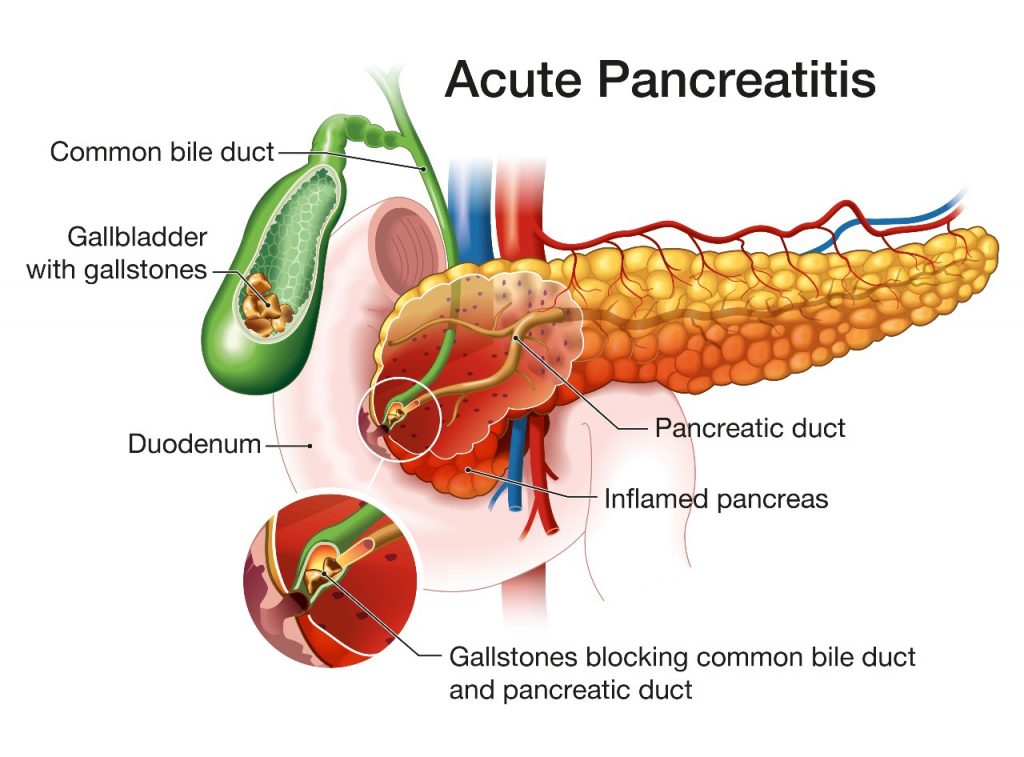Introduction:
Welcome to our comprehensive guide on pancreatitis. Pancreatitis is a condition characterized by inflammation of the pancreas, a vital organ responsible for producing enzymes to aid in digestion and hormones to regulate blood sugar levels. Whether you’re seeking information for yourself or a loved one, our website aims to provide you with a thorough understanding of pancreatitis, its causes, symptoms, diagnosis, treatment options, and steps for prevention and management.
What is Pancreatitis?
- Definition: Explain what pancreatitis is, highlighting the inflammation of the pancreas and its impact on digestive function and overall health.
- Types of Pancreatitis: Differentiate between acute pancreatitis, which occurs suddenly and often resolves with treatment, and chronic pancreatitis, which is characterized by long-term inflammation and damage to the pancreas.

Causes and Risk Factors:
- Gallstones: Explore how gallstones blocking the pancreatic duct can lead to pancreatitis.
- Alcohol Consumption: Discuss the role of heavy alcohol consumption in causing both acute and chronic pancreatitis.
- Other Causes: Include less common causes such as certain medications, infections, autoimmune conditions, and genetic factors.
- Risk Factors: Identify factors that may increase the risk of developing pancreatitis, such as obesity, family history, and certain medical conditions like hypercalcemia and hypertriglyceridemia.
Symptoms and Diagnosis:
- Common Symptoms: Outline the typical symptoms of pancreatitis, including severe abdominal pain, nausea, vomiting, fever, and rapid pulse.
- Diagnostic Procedures: Describe the various tests used to diagnose pancreatitis, including blood tests (amylase, lipase levels), imaging studies (ultrasound, CT scan, MRI), and endoscopic procedures (ERCP).
Treatment Options:
- Acute Pancreatitis Management: Detail the treatment approach for acute pancreatitis, which may involve hospitalization, fasting, pain management, intravenous fluids, and addressing underlying causes.
- Chronic Pancreatitis Management: Discuss the long-term management strategies for chronic pancreatitis, including lifestyle modifications (dietary changes, alcohol cessation), pain management, enzyme replacement therapy, and surgical interventions in severe cases.
- Complication Management: Address potential complications of pancreatitis, such as pancreatic pseudocysts, infections, diabetes mellitus, and pancreatic cancer risk, and outline their management.
Prevention and Lifestyle Management:
- Dietary Recommendations: Offer guidance on following a pancreatitis-friendly diet, including low-fat, high-protein, and nutrient-rich foods, while avoiding alcohol, spicy foods, and large meals.
- Alcohol Moderation: Emphasize the importance of limiting alcohol consumption or abstaining altogether to prevent recurrent pancreatitis episodes.
- Healthy Lifestyle Habits: Encourage maintaining a healthy weight, exercising regularly, managing stress, and avoiding smoking to reduce the risk of pancreatitis and its complications.
Support and Resources:
- Support Groups: Provide information on online and in-person support groups where individuals with pancreatitis and their caregivers can connect, share experiences, and find encouragement.
- Educational Materials: Offer downloadable resources, fact sheets, and informational brochures on pancreatitis for further reading and reference.
- Healthcare Provider Directory: Include a directory of healthcare providers specializing in gastroenterology, hepatology, and pancreatology for individuals seeking specialized care for pancreatitis.
Conclusion:
Pancreatitis is a challenging condition that requires comprehensive management and lifestyle modifications to optimize health and prevent complications. By understanding the causes, symptoms, diagnosis, treatment options, and preventive measures outlined in this guide, individuals affected by pancreatitis can take proactive steps to manage their condition effectively and improve their quality of life. Remember, you are not alone in your journey, and there are resources and support available to help you navigate the challenges of pancreatitis with resilience and hope.
